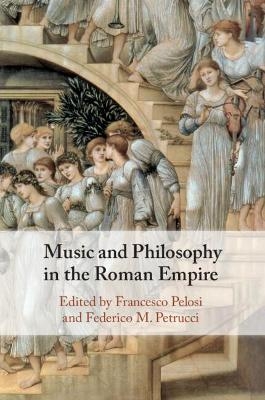
Music and Philosophy in the Roman Empire
Cambridge University Press (Verlag)
978-1-108-94095-5 (ISBN)
Is music just matter of hearing and producing notes? And is it of interest just to musicians? By exploring different authors and philosophical trends of the Roman Empire, from Philo of Alexandria to Alexander of Aphrodisias, from the rebirth of Platonism with Plutarch to the last Neoplatonists, this book sheds light on different ways in which music and musical notions were made a crucial part of philosophical discourse. Far from being mere metaphors, notions such as harmony, concord and attunement became key philosophical tools in order to better grasp and conceptualise fundamental notions in philosophical debates from cosmology to ethics and from epistemology to theology. The volume is written by a distinguished international team of contributors.
Francesco Pelosi is Lecturer of History of Ancient Philosophy at the University of Pisa. His main field of study concerns the interaction between music and philosophy in ancient Greece, with a special focus on the mind-body relationship and theories of perception. He is the author of Plato on Music, Soul and Body (Cambridge, 2010). Federico M. Petrucci is Professor of History of Ancient Philosophy at the University of Turin. His main research areas are Plato and the Platonist Tradition and his publications include the first English translation of the texts of the Platonist Taurus of Beirut (2018).
Introduction Francesco Pelosi and Federico Maria Petrucci; 1. Scala nature and music: two models in Philo's thought Carlos Lévy; 2. Music and Plutarch's Platonic cosmos Bram Demulder; 3. The harmoniser god: harmony as a cosmological model in middle Platonist theology Federico M. Petrucci; 4. Alexander of Aphrodisias and musical models for ontological enquiries Laura M. Castelli; 5. How to resist musical dogmatism: the aim and methods of Pyrrhonian inquiry in Sextus Empiricus' 'Against the Musicologists' (Math. VI) Máté Veres; 6. Shifting epistemological perspectives in Ptolemy's 'Harmonics': from the science of sound to the study of music Andrew Barker; 7. Musical imagery in Clement of Alexandria and Origen: the Greek musical world revised and accepted Francesco Pelosi; 8. Plotinus on music, rhythm, and harmony Alexandra Michalewski; 9. Porphyry's 'Commentary on Ptolemy's Harmonics': questions of philosophic and scientific identity Harold Tarrant; 10. The music of the virtues in late ancient Platonism Dominic O'Meara; 11. Harmonics as theological paradigm in Proclus Stephen Gersh; 12. Calcidius on cosmic harmony Christina Hoenig; 13. Harmonia in Philoponus' 'Commentary on Nicomachus' introduction to arithmetic' Giovanna R. Giardina.
| Erscheinungsdatum | 14.03.2022 |
|---|---|
| Zusatzinfo | Worked examples or Exercises |
| Verlagsort | Cambridge |
| Sprache | englisch |
| Maße | 152 x 228 mm |
| Gewicht | 520 g |
| Themenwelt | Kunst / Musik / Theater ► Kunstgeschichte / Kunststile |
| Kunst / Musik / Theater ► Musik | |
| Geisteswissenschaften ► Philosophie ► Philosophie Altertum / Antike | |
| ISBN-10 | 1-108-94095-1 / 1108940951 |
| ISBN-13 | 978-1-108-94095-5 / 9781108940955 |
| Zustand | Neuware |
| Haben Sie eine Frage zum Produkt? |
aus dem Bereich


